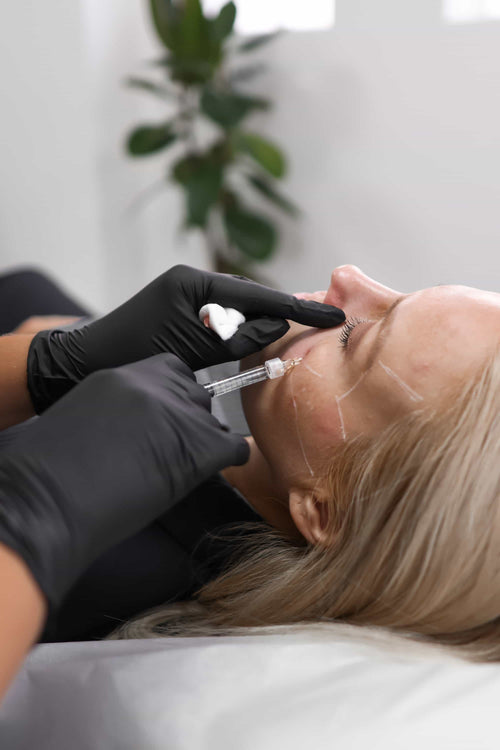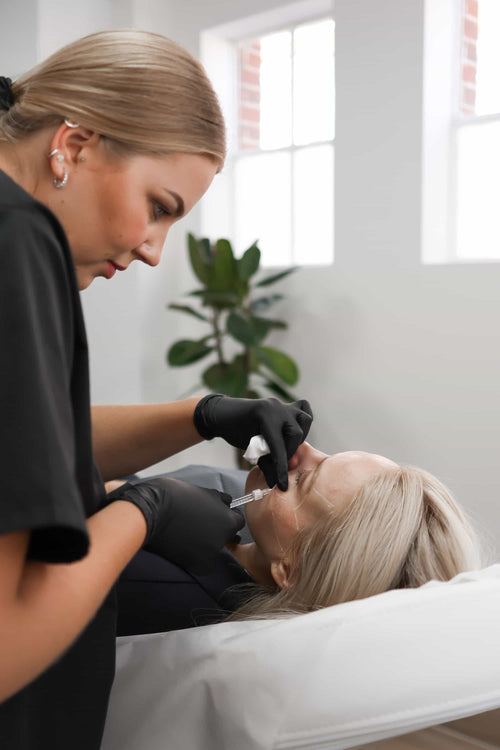Book Your Dermal Filler Consultation with Dr. Laura Geige
Consult Your Doctor
Medical History Matters
Before considering lip fillers, consulting your doctor is crucial for ensuring a safe and successful outcome. Your medical history plays a significant role in determining your candidacy and potential risks.

Here’s why medical history matters when it comes to lip fillers:

- Allergies:**
- Bleeding Disorders:**
- Autoimmune Diseases:**
- Skin Conditions:**
- Pregnancy and Breastfeeding:**
- Previous Filler Experiences:**
Inform your doctor about any allergies you have, especially to anesthetic agents, hyaluronic acid (a common filler ingredient), or other medications. Allergies can lead to severe reactions, including anaphylaxis.
If you have a bleeding disorder or take blood thinners, your doctor needs to know. Fillers can increase bleeding risk, and adjustments may be necessary to minimize complications.
Book a Dermal Filler Consultation with Dr. Laura Geige Now
Certain autoimmune diseases can affect wound healing and increase the risk of complications from fillers.
Active skin conditions, such as herpes simplex virus (HSV) or eczema in the injection area, can complicate treatment. Your doctor may advise on managing these conditions before filler injections.
The safety of fillers during pregnancy and breastfeeding is not fully established. It’s essential to discuss your plans with your doctor.
Share details about any previous filler experiences, including the type of filler used, the results, and any adverse reactions you encountered. This information can help your doctor make informed decisions.
Open communication with your doctor is paramount to ensuring a safe and satisfying lip filler experience.
Realistic Expectations
Before undergoing any cosmetic procedure, including lip filler injections, it’s crucial to consult with a qualified and experienced medical professional.
Here are some reasons why consulting your doctor before getting lip filler is essential:
* **Assess Your Medical History:** Your doctor will review your medical history to identify any potential risks or contraindications. Certain medical conditions, medications, or allergies may make lip fillers unsafe for you.
• **Discuss Your Desired Outcomes:** Be open and honest with your doctor about your aesthetic goals. They can help you determine if lip filler is the right treatment for you and guide your expectations based on your anatomy and desired look.
• **Address Concerns and Questions:** This is a chance to ask any questions you have about the procedure, potential side effects, risks, recovery time, and aftercare instructions. Don’t hesitate to express any concerns or anxieties.
• **Choose the Right Practitioner:** Your doctor can help you find a reputable and experienced injector who specializes in lip augmentation. Look for someone certified by a recognized medical board and with ample experience performing lip filler procedures.
• **Develop a Personalized Treatment Plan:** Your doctor will tailor the treatment plan to your individual needs, considering factors such as your skin type, facial structure, desired volume, and any pre-existing conditions.
Realistic Expectations are Vital
It’s important to have realistic expectations about the results of lip filler. While it can enhance the appearance of your lips, it won’t transform them drastically. Remember that:
* **Lip filler is a temporary solution.** Results typically last 6-18 months, after which touch-up injections may be needed to maintain the desired fullness.
• **Individual results vary.** Factors such as your metabolism, skin elasticity, and lip anatomy can influence how well the filler takes and how long it lasts.
• **Overcorrection can lead to an unnatural appearance.** Avoid going overboard with volume. Discuss your desires with your doctor to achieve a natural-looking enhancement.
• **Patience is key.** It may take time for the swelling to subside fully after the injections, and the final results may not be immediately apparent.
By consulting your doctor and setting realistic expectations, you can make an informed decision about lip filler and increase the likelihood of achieving a beautiful and natural-looking outcome.
Prep Your Lips
Exfoliate Gently
Prepping your lips before a lip filler appointment is crucial for maximizing results and minimizing potential complications.
One essential step is to exfoliate gently.
Here’s why and how to do it correctly:
* **Removes dead skin:** Dead skin cells can create a barrier, preventing the filler from being injected effectively and potentially leading to uneven results.
* **Promotes smoother injections:** Exfoliation allows for easier and more precise injection of the filler, resulting in a more natural-looking outcome.
* **Reduces irritation:** Rough lip texture can irritate the skin, increasing the risk of inflammation or bruising after the procedure.
How to exfoliate gently:
-
Use a soft-bristled toothbrush.
-
Gently brush your lips in circular motions for about 30 seconds.
-
Avoid harsh scrubbing, as this can damage the delicate skin.
-
Follow with a gentle lip balm to hydrate and soothe your lips.
Hydrate Inside and Out
Getting lip fillers can be a fantastic way to enhance your natural features and boost your confidence. However, prepping your lips properly beforehand is crucial for achieving optimal results and minimizing any potential complications.
Get Started with Your Dermal Filler Consultation with Dr. Laura Geige
Here are some essential steps to take before your lip filler appointment:
-
Prep Your Lips:
-
Exfoliate Gently: Use a gentle lip scrub or toothbrush to remove dead skin cells. This will ensure that the filler is applied smoothly and evenly.
-
Moisturize Deeply: Apply a rich, hydrating lip balm several times a day in the week leading up to your appointment. This will plump the lips and prepare them for the filler.
-
Hydrate Inside and Out:
-
Drink Plenty of Water: Staying hydrated is essential for overall skin health, including your lips. Aim for at least 8 glasses of water per day in the days leading up to your appointment.
-
Limit Alcohol and Caffeine: These substances can dehydrate you, potentially causing your lips to appear thinner.
-
Avoid Certain Medications: Talk to your provider about any medications or supplements you are taking, as some may increase bleeding or bruising.
By following these simple steps, you can help ensure that your lip filler experience is as smooth and successful as possible.
Post-Procedure Care Essentials
Ice, Ice Baby
Post-procedure care is crucial for ensuring optimal results and minimizing complications after lip filler treatment.
Here are some essential post-procedure care tips:
-
Avoid strenuous activity, including exercise, for at least 24 hours following the procedure.
-
Refrain from touching or picking at the injection sites.
-
Do not apply makeup to the treated area for at least 24 hours.
-
Drink plenty of water to stay hydrated, as this can help reduce swelling.
-
Apply a cold compress or ice pack wrapped in a towel to the area for 15-20 minutes at a time, several times a day. This will help minimize bruising and swelling.
“Ice, Ice Baby” is a helpful tool in managing post-filler discomfort and swelling.
Here are some tips for using ice effectively:
*
Use a soft cloth or towel to wrap the ice pack to avoid direct contact with your skin.
*
Apply ice for short intervals, around 15-20 minutes at a time.
*
Avoid leaving the ice on for too long, as this can damage the skin.
Follow these post-procedure care instructions carefully to promote healing and minimize any potential side effects. If you experience any unusual symptoms or concerns, contact your injector immediately.
Avoid Touching Temptations
Following any cosmetic procedure, especially one involving injections like lip fillers, proper post-procedure care is crucial for optimal healing and desired results.
Here are some essential tips to ensure a smooth recovery:
* **Ice application:** Apply an ice pack wrapped in a thin towel to the treated area for 10-15 minutes at a time, several times daily. This helps minimize swelling and discomfort.
* **Avoid touching or rubbing:** Resist the urge to touch, rub, or massage your lips excessively. This can introduce bacteria and disrupt the healing process.
* **Stay hydrated:** Drink plenty of water to keep your body hydrated and promote healing.
* **Maintain a healthy diet:** Consume nutrient-rich foods to support your body’s natural repair mechanisms. Avoid spicy, acidic, or salty foods that may irritate the treated area.
* **Sleep elevated:** Elevate your head with an extra pillow while sleeping to reduce swelling.
**Product Restrictions:**
- Refrain from using any makeup, skincare products, or lip balms containing retinol, acids (e.g., glycolic, salicylic), or fragrances on the treated area for at least 24 hours.
- Avoid hot showers or baths for a few days, as they can increase blood flow and swelling.
- Limit strenuous activity and exercise for the first few days to minimize strain on the treated area.
**Important Note:** Avoid touching temptations that might compromise healing. Resist the urge to pick at any scabs or dry patches, as this can lead to scarring and uneven results. Follow your provider’s specific post-procedure instructions carefully for optimal outcomes.
Emily Patricia Fae Divine Magazine Divine Magazine Audrey’s JL Decléor Direct
- Upper Face Anti Wrinkle Treatment Near Brooklands, Surrey - January 7, 2025
- Skin Pen Microneedling Near Merton, Surrey - January 6, 2025
- Retinol Peel Near Weybridge, Surrey - January 5, 2025
